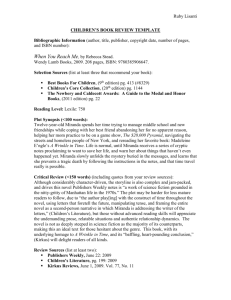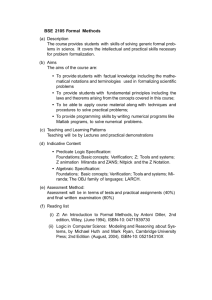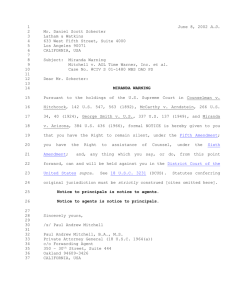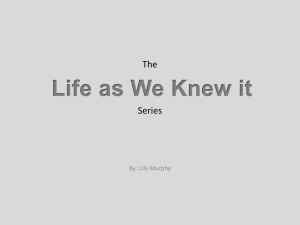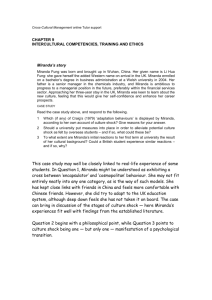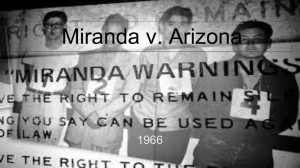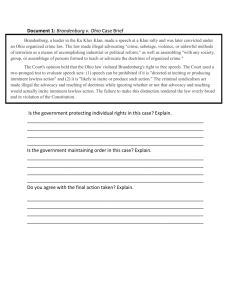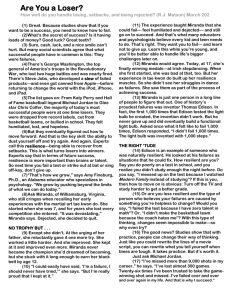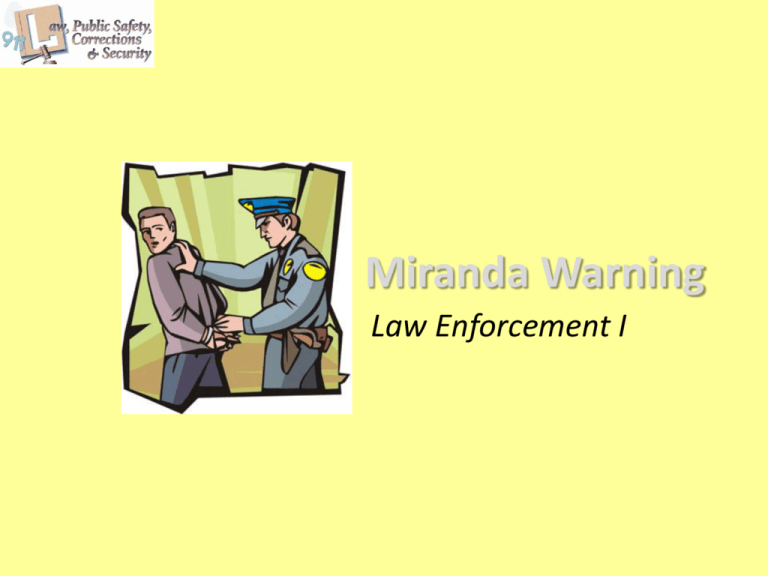
Miranda Warning
Law Enforcement I
Copyright and Terms of Service
Copyright © Texas Education Agency, 2011. These materials are copyrighted © and trademarked ™ as
the property of the Texas Education Agency (TEA) and may not be reproduced without the express
written permission of TEA, except under the following conditions:
1) Texas public school districts, charter schools, and Education Service Centers may reproduce and use
copies of the Materials and Related Materials for the districts’ and schools’ educational use without
obtaining permission from TEA.
2) Residents of the state of Texas may reproduce and use copies of the Materials and Related Materials
for individual personal use only, without obtaining written permission of TEA.
3) Any portion reproduced must be reproduced in its entirety and remain unedited, unaltered and
unchanged in any way.
4) No monetary charge can be made for the reproduced materials or any document containing them;
however, a reasonable charge to cover only the cost of reproduction and distribution may be
charged.
Private entities or persons located in Texas that are not Texas public school districts, Texas Education
Service Centers, or Texas charter schools or any entity, whether public or private, educational or noneducational, located outside the state of Texas MUST obtain written approval from TEA and will be
required to enter into a license agreement that may involve the payment of a licensing fee or a royalty.
Contact TEA Copyrights with any questions you may have.
Copyright © Texas Education Agency 2012. All rights reserved.
Images and other multimedia content used with permission.
2
Miranda v. Arizona (1966)
• Ernesto Miranda was accused of the
kidnapping and rape of an 18-year-old female
• He was identified by the girl 10 days later
• The police interrogated Miranda for two hours
• The police obtained a written and signed
confession
• The confession was used at the trial
• Miranda was found guilty
Copyright © Texas Education Agency 2012. All rights reserved.
Images and other multimedia content used with permission.
3
Miranda v. Arizona (1966) (continued)
• Miranda appealed the court’s decision
– Miranda argued that he
• Had not been told that he had the right to remain silent
• Would not have confessed if he had been told about this right
– The Supreme Court overturned the trial, giving Miranda a
new trial without the use of the confession
– Miranda was again convicted
• The Miranda decision was then codified into the Texas
Law in the Code of Criminal Procedure Article 38.22
• Texas added that “you may terminate this interview at
anytime”
Copyright © Texas Education Agency 2012. All rights reserved.
Images and other multimedia content used with permission.
4
Miranda Requirements
for Juvenile Suspects
• Child (Family Code Section 51.02)
– Ten years of age or older and under 17 years of age
– Under 18 years of age who is alleged or found to
have engaged in delinquent conduct or conduct
indicating a need for supervision as a result of acts
committed before becoming 17 years of age
• The Miranda warning must be issued by a
magistrate prior to any statement
Copyright © Texas Education Agency 2012. All rights reserved.
Images and other multimedia content used with permission.
5
Miranda Requirements
for Juvenile Suspects (continued)
• Admissibility of statements
– Must be in writing
– Must be signed in the presence of a magistrate without
the presence of a bailiff, prosecuting attorney, or law
enforcement officer
– The magistrate must believe that the juvenile
understood the Miranda warning and that the statement
was given voluntarily; then the magistrate will sign the
certification acknowledging that these occurred
– The juvenile must intelligently, knowingly, and
willingly waive their rights before and during their
statement
Copyright © Texas Education Agency 2012. All rights reserved.
Images and other multimedia content used with permission.
6
Miranda Requirements
for Juvenile Suspects (continued)
• Federal Juvenile Delinquency Act 18 USC
5033
– A juvenile taken into custody for juvenile
delinquency must be informed in understandable
language of his or her rights by the arresting
officer
– The Attorney General and parent or guardian must
also be contacted and made aware of the juvenile’s
rights and the alleged offense
– Then the juvenile is to be taken before a magistrate
Copyright © Texas Education Agency 2012. All rights reserved.
Images and other multimedia content used with permission.
7
Miranda Requirements
for Juvenile Suspects (continued)
• School settings
– Juveniles that are interrogated in a school setting
will be considered “in custody” for Miranda
purposes
– School officials are not bound by the Miranda
warning and do not have to give the juvenile a
warning unless they are acting as a direct agent for
the police
Copyright © Texas Education Agency 2012. All rights reserved.
Images and other multimedia content used with permission.
8
Miranda Requirements for Suspects
• The courts ruled that in order for the Miranda
warning to be required, the circumstances had
to meet a two-prong test
– The person was in custody, and
– The person was interrogated
Copyright © Texas Education Agency 2012. All rights reserved.
Images and other multimedia content used with permission.
9
Miranda Requirements for Suspects
(continued)
• Suspects are considered in custody
– When they are not free to leave
– The court states
• Being physically deprived of freedom in any significant way
• Law enforcement has told the person he or she is not free to
leave
• Law enforcement creates a situation that would lead a
reasonable person to believe that his or her freedom of
movement has been greatly restricted
• When there is probable cause to arrest and a law enforcement
does not tell the person he or she is free to leave
Copyright © Texas Education Agency 2012. All rights reserved.
Images and other multimedia content used with permission.
10
Miranda Requirements for Suspects
(continued)
• Interrogation
– Law enforcement asks the suspect(s) questions
– If the suspect voluntarily offers information that is
not in response to any question asked, even if he or
she is in custody, the statement is admissible
without the Miranda warning because the twoprong test of interrogation is not met
Copyright © Texas Education Agency 2012. All rights reserved.
Images and other multimedia content used with permission.
11
Miranda Requirements for Suspects
(continued)
• Waiver of Miranda rights
– Suspects must make a knowing, intelligent, and
voluntary waiver of rights after they have been read
their rights
– The court looks at two factors when allowing the
waiver of rights:
• To be voluntary it must be the product of a free and
deliberate choice, and not the product of coercion,
intimidation, or deception
• Was it made by the defendant with full awareness of both the
nature of the rights being abandoned and the consequences of
the decision to abandon them
Copyright © Texas Education Agency 2012. All rights reserved.
Images and other multimedia content used with permission.
12
Miranda Requirements for Suspects
(continued)
• Who must give the Miranda warning?
– Written statements – the warning must be given by a magistrate
or the person to whom the statement is being made
– Oral statements
• Someone other than the person to whom the statement is being made
can give the warning as long as they are on the recording
• There must be an electronic recording of the statement: either video or
audio or both
• Prior to making a statement, the Miranda warning must be given on the
recording
• The defendant must waive his or her rights
• The recording device must be capable of making accurate recordings
and the operator competent; recording must be accurate and unaltered
• All voices on the recording must be identified
Copyright © Texas Education Agency 2012. All rights reserved.
Images and other multimedia content used with permission.
13
Miranda Requirements for Offenders
• If the offender is in custody because of an offense other
than the one he or she is being questioned about, the
court says these factors must be considered when
determining the need for the Miranda warning:
– The language used to summon the offender
– The physical surroundings of the interrogation
– The extent to which the offender is confronted with the
evidence of guilt
– The additional pressure exerted to detain the offender or the
change in surroundings of the offender which results in an
added imposition on the offender’s freedom
– The offender’s freedom to leave the scene and the purpose,
place, and length of the questioning
Copyright © Texas Education Agency 2012. All rights reserved.
Images and other multimedia content used with permission.
14
Miranda Requirements for Witnesses
• There is no legal requirement for Miranda
when someone is a witness; witnesses are free
to leave at any time
• If you are arrested based on your statements as
a witness, the Miranda warning would apply
• As a witness, if the police determine you are
obstructing justice, and charge you with such,
the Miranda warning then applies
Copyright © Texas Education Agency 2012. All rights reserved.
Images and other multimedia content used with permission.
15
Resources
• Judge Erin Bakker
• http://www.fletc.gov/training/programs/legaldivision/the-informer/research-by-subject/5thamendment/juvenilemirandarights.pdf
• Federal Juvenile Delinquency Act 18 USC 5033
http://uscode.house.gov/download/pls/18C403.txt
• Texas Constitution and Statutes
http://www.statutes.legis.state.tx.us/
• Do an Internet search for the following: Supreme
Court: Suspects must invoke right to remain silent
in interrogations
Copyright © Texas Education Agency 2012. All rights reserved.
Images and other multimedia content used with permission.
16


